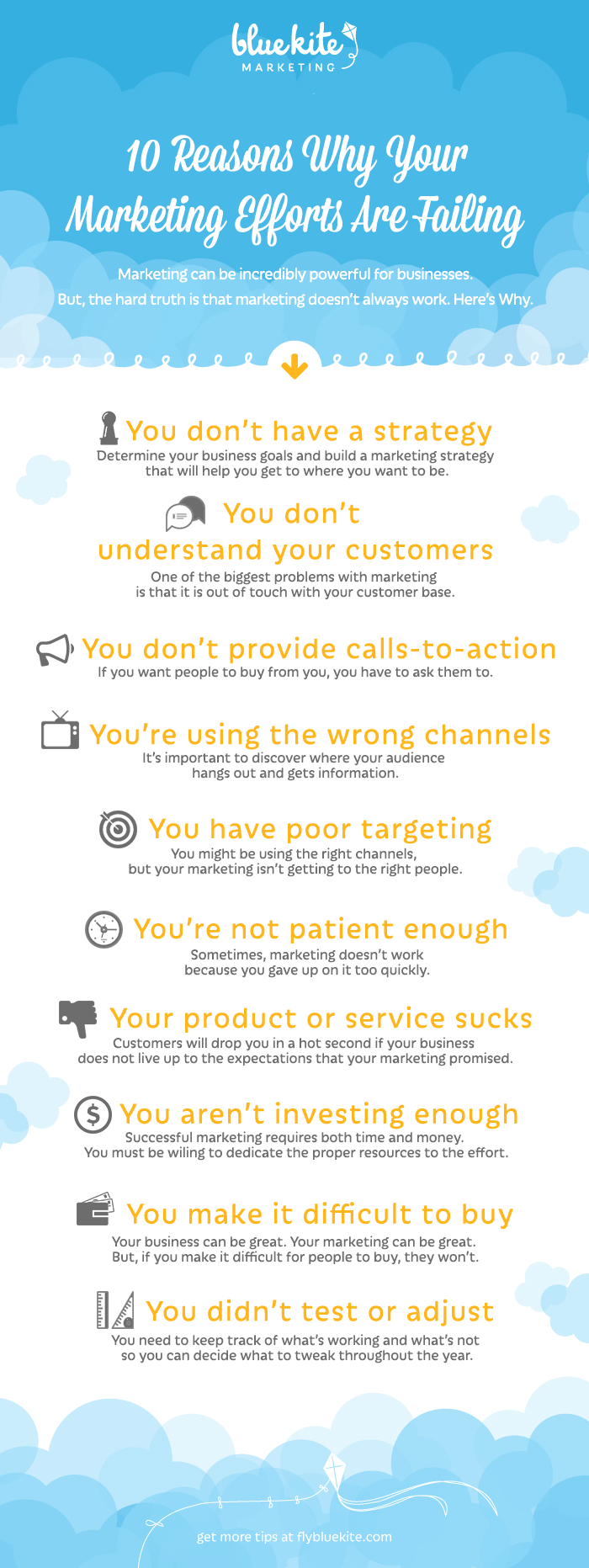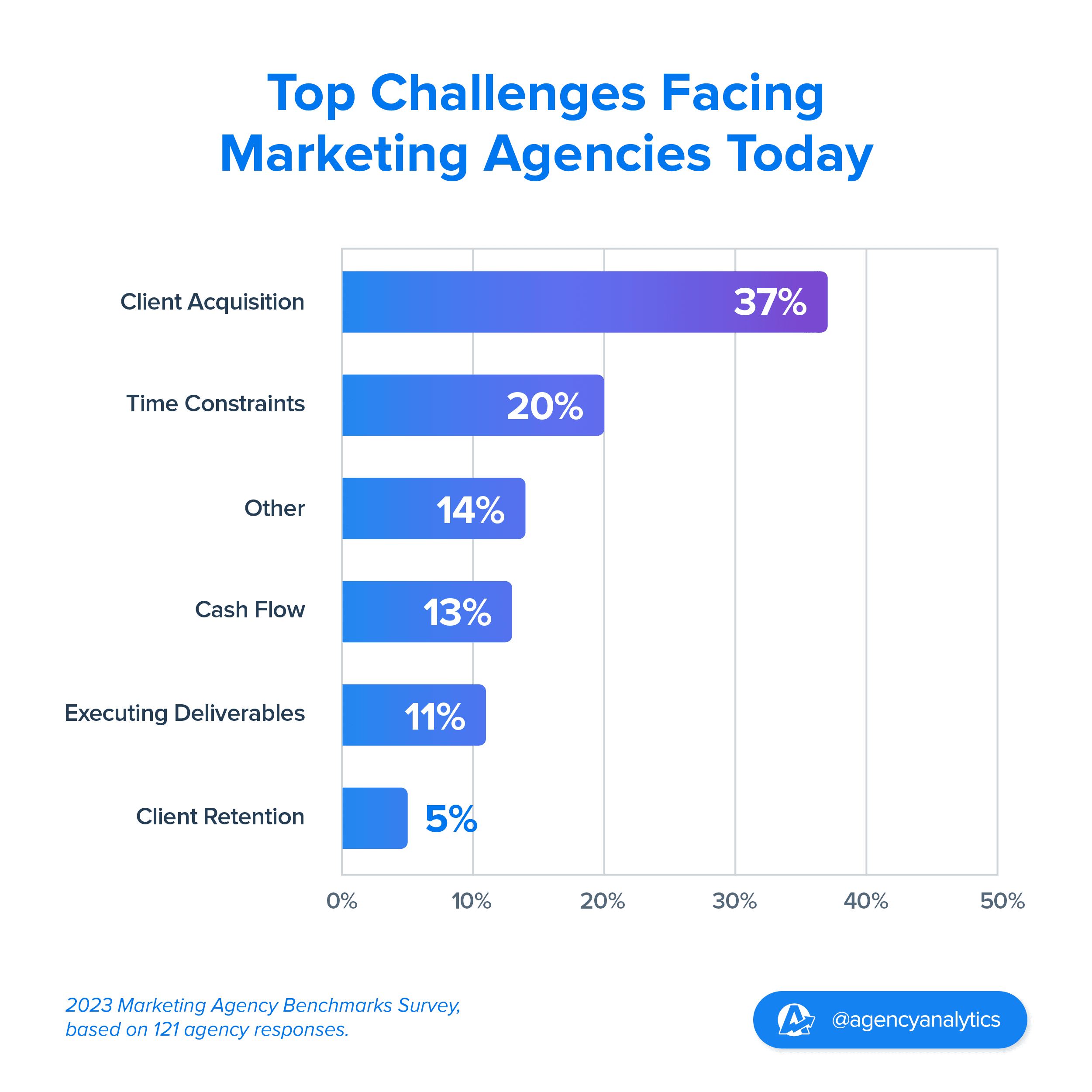Marketing agencies play a crucial role in helping businesses grow, yet many fail to sustain themselves in a competitive industry. The reasons behind their failure are multifaceted, ranging from poor financial management and lack of differentiation to ineffective client communication and an inability to adapt to evolving market trends. Additionally, agencies often struggle with talent retention, overpromising results, or failing to deliver measurable outcomes. Understanding these challenges is essential for both agency leaders and clients seeking long-term partnerships. This article explores the key factors contributing to the failure of marketing agencies and offers insights into how they can overcome these obstacles to thrive in a dynamic business environment.
Why Do Marketing Agencies Fail?
Marketing agencies often face challenges that can lead to their failure. Understanding these reasons is crucial for both agency owners and clients. Below, we explore the key factors contributing to the failure of marketing agencies.
See Also What Is the Daily Life of a Marketer?
What Is the Daily Life of a Marketer?1. Lack of Clear Business Strategy
Many marketing agencies fail because they lack a clear business strategy. Without a well-defined plan, agencies struggle to set goals, allocate resources, and measure success. A strong strategy should include target markets, service offerings, and long-term objectives. Agencies that fail to adapt to market changes or innovate often fall behind their competitors.
2. Poor Financial Management
Financial mismanagement is a common reason for the downfall of marketing agencies. Issues such as overspending, underpricing services, or failing to maintain a steady cash flow can cripple an agency. Proper budgeting, cost control, and accurate pricing models are essential to ensure sustainability and profitability.
See Also What's the best way to grow my email list(s)?
What's the best way to grow my email list(s)?3. Ineffective Client Communication
Marketing agencies rely heavily on client relationships. Poor communication can lead to misunderstandings, unmet expectations, and lost clients. Agencies must prioritize transparency, regular updates, and active listening to build trust and maintain long-term partnerships.
4. Inability to Adapt to Industry Changes
The marketing industry is constantly evolving with new technologies and trends. Agencies that fail to stay updated or adapt to changes risk becoming obsolete. Investing in employee training, new tools, and innovative strategies is crucial to remain competitive in a dynamic market.
See Also Is It the Job Market in General or Marketing Specifically?
Is It the Job Market in General or Marketing Specifically?5. Overdependence on a Few Clients
Relying too heavily on a small number of clients can be risky. If one or two clients leave, the agency may face significant financial instability. Diversifying the client portfolio and expanding services can help mitigate this risk and ensure steady revenue streams.
| Key Factor | Impact | Solution |
|---|---|---|
| Lack of Clear Business Strategy | Unclear goals and direction | Develop a detailed business plan |
| Poor Financial Management | Cash flow issues and overspending | Implement strict budgeting and pricing strategies |
| Ineffective Client Communication | Lost clients and damaged relationships | Prioritize transparency and regular updates |
| Inability to Adapt to Industry Changes | Becoming obsolete | Invest in training and new technologies |
| Overdependence on a Few Clients | Financial instability | Diversify client base and services |
Why do most marketing companies fail?

 What are some direct-to-consumer brands that you admire and why?
What are some direct-to-consumer brands that you admire and why?Lack of a Clear Strategy
One of the primary reasons marketing companies fail is the absence of a clear and actionable strategy. Without a well-defined plan, companies often struggle to achieve their goals. Key issues include:
- Unclear objectives: Failing to set specific, measurable, achievable, relevant, and time-bound (SMART) goals.
- Poor targeting: Not identifying the right audience or market segment to focus efforts on.
- Inconsistent messaging: Lacking a unified brand voice or message across campaigns.
Insufficient Market Research
Many marketing companies fail because they do not invest enough time or resources into market research. This leads to misguided decisions and ineffective campaigns. Common pitfalls include:
See Also Which AI Marketing Tools Are Actually Worth It?
Which AI Marketing Tools Are Actually Worth It?- Ignoring customer needs: Not understanding what the target audience truly wants or values.
- Overlooking competitors: Failing to analyze competitors' strengths and weaknesses.
- Relying on assumptions: Making decisions based on guesswork rather than data-driven insights.
Poor Financial Management
Financial mismanagement is a significant factor in the failure of marketing companies. Without proper budgeting and resource allocation, companies struggle to sustain operations. Key financial mistakes include:
- Overspending on ineffective campaigns: Allocating too much budget to strategies that do not yield results.
- Underestimating costs: Failing to account for hidden or unexpected expenses.
- Lack of ROI tracking: Not measuring the return on investment for marketing activities.
Failure to Adapt to Trends
Marketing companies that fail to stay updated with industry trends often lose their competitive edge. This includes:
- Ignoring digital transformation: Not leveraging new technologies or platforms like AI, social media, or automation.
- Resisting change: Sticking to outdated methods instead of embracing innovation.
- Overlooking data analytics: Not using data to refine strategies and improve outcomes.
Weak Team Dynamics
A lack of collaboration and expertise within the team can lead to the downfall of marketing companies. Common team-related issues include:
- Poor communication: Misalignment between team members or departments.
- Lack of skilled professionals: Hiring individuals without the necessary expertise or experience.
- High turnover rates: Frequent staff changes disrupting workflow and continuity.
What do marketing agencies struggle with?

1. Client Retention and Satisfaction
Marketing agencies often struggle with maintaining long-term relationships with clients. Clients may have high expectations, and agencies must consistently deliver results to keep them satisfied. Common challenges include:
- Misaligned expectations between the agency and the client.
- Difficulty in demonstrating measurable ROI for campaigns.
- Clients switching agencies due to lack of perceived value.
2. Adapting to Rapid Technological Changes
The marketing landscape is constantly evolving, and agencies must stay ahead of the curve. This can be challenging due to:
- The need to invest in new tools and platforms regularly.
- Keeping up with algorithm updates on social media and search engines.
- Training staff to use emerging technologies effectively.
3. Talent Acquisition and Retention
Finding and keeping skilled professionals is a significant hurdle for marketing agencies. Key issues include:
- High competition for top talent in the industry.
- Employees seeking better opportunities or work-life balance.
- The cost of training and development for new hires.
4. Proving ROI to Clients
Demonstrating the return on investment for marketing efforts is a persistent challenge. Agencies face:
- Difficulty in tracking and attributing results to specific campaigns.
- Clients demanding immediate results without understanding long-term strategies.
- Lack of standardized metrics to measure success across industries.
5. Managing Multiple Clients and Projects
Juggling the needs of various clients and projects can overwhelm agencies. Common struggles include:
- Resource allocation across multiple campaigns.
- Meeting tight deadlines without compromising quality.
- Balancing client demands with internal capabilities.
What is the failure rate of marketing agencies?

The failure rate of marketing agencies is relatively high, with studies suggesting that approximately 50% of new marketing agencies fail within the first five years. This high failure rate is often attributed to factors such as intense competition, lack of differentiation, insufficient client acquisition strategies, and poor financial management. Additionally, many agencies struggle to adapt to rapidly changing market trends and technologies, which can further contribute to their downfall.
Why do marketing agencies fail?
Marketing agencies fail for a variety of reasons, many of which are preventable with proper planning and execution. Below are some of the most common causes:
- Lack of differentiation: Many agencies fail to establish a unique value proposition, making it difficult to stand out in a crowded market.
- Poor financial management: Inadequate budgeting, cash flow issues, and overspending can lead to financial instability.
- Inability to adapt: Agencies that fail to keep up with evolving technologies and consumer behaviors often lose relevance.
What are the key challenges faced by marketing agencies?
Marketing agencies face numerous challenges that can impact their success or failure. Some of the most significant challenges include:
- Client retention: Maintaining long-term relationships with clients is critical, as losing key accounts can severely impact revenue.
- Talent acquisition: Finding and retaining skilled professionals in a competitive industry can be difficult.
- Market saturation: The abundance of agencies makes it harder to attract and retain clients.
How can marketing agencies reduce their failure rate?
To reduce the likelihood of failure, marketing agencies can implement several strategies:
- Focus on niche markets: Specializing in a specific industry or service can help agencies differentiate themselves.
- Invest in technology: Adopting the latest tools and platforms can improve efficiency and service quality.
- Prioritize client relationships: Building strong, trust-based relationships with clients can lead to repeat business and referrals.
What role does financial planning play in the success of marketing agencies?
Financial planning is crucial for the survival and growth of marketing agencies. Key aspects include:
- Budgeting: Allocating resources effectively to avoid overspending and ensure profitability.
- Cash flow management: Ensuring there is enough liquidity to cover operational expenses and unexpected costs.
- Revenue diversification: Reducing reliance on a single client or service by expanding offerings and client base.
Why are ad agencies dying?
1. Shift to In-House Marketing Teams
Many companies are bringing their advertising efforts in-house to reduce costs and maintain greater control over their brand messaging. This shift is driven by the following factors:
- Cost Efficiency: In-house teams eliminate the need for agency fees, making it a more budget-friendly option.
- Faster Turnaround: Internal teams can respond more quickly to market changes and campaign adjustments.
- Brand Consistency: Companies can ensure their messaging aligns perfectly with their vision and values.
2. Rise of Digital Marketing Platforms
The rise of digital marketing platforms has made it easier for businesses to manage their own campaigns without relying on traditional ad agencies. Key reasons include:
- Accessibility: Platforms like Google Ads and Facebook Ads are user-friendly and require minimal expertise.
- Data-Driven Insights: Real-time analytics allow businesses to optimize campaigns without external help.
- Automation Tools: AI and machine learning tools streamline ad creation and targeting processes.
3. Changing Consumer Behavior
Consumer behavior has evolved, making traditional advertising methods less effective. This shift impacts ad agencies in the following ways:
- Ad Avoidance: Consumers increasingly use ad blockers or skip ads, reducing their effectiveness.
- Preference for Authenticity: Audiences favor genuine, user-generated content over polished agency campaigns.
- Demand for Personalization: Tailored marketing requires data and tools that many agencies struggle to provide.
4. Increased Competition from Freelancers
Freelancers and boutique agencies are offering specialized services at competitive rates, challenging traditional ad agencies. This trend is fueled by:
- Lower Costs: Freelancers often charge less than large agencies, appealing to budget-conscious clients.
- Niche Expertise: Freelancers can offer highly specialized skills tailored to specific industries or platforms.
- Flexibility: Clients can hire freelancers on a project-by-project basis, avoiding long-term commitments.
5. Economic Pressures and Budget Cuts
Economic challenges have forced many businesses to cut marketing budgets, impacting ad agencies. Key factors include:
- Recession Fears: Companies prioritize essential spending, often reducing investments in advertising.
- ROI Focus: Businesses demand measurable results, putting pressure on agencies to deliver.
- Reduced Client Spending: Smaller budgets mean fewer opportunities for agencies to secure lucrative contracts.
Frequently Asked Questions from Our Community
Why do marketing agencies fail to retain clients?
Marketing agencies often struggle to retain clients due to a lack of clear communication and unrealistic expectations. Clients expect measurable results, and when these are not delivered, trust erodes. Additionally, agencies may fail to adapt to the client's evolving needs or industry trends, leading to dissatisfaction. Without a strong focus on building long-term relationships and consistently delivering value, agencies risk losing clients to competitors.
Why do marketing agencies fail to scale their operations?
Scaling a marketing agency requires a solid operational foundation and efficient processes. Many agencies fail to scale because they lack the necessary infrastructure, such as project management tools or skilled teams. Over-reliance on a few key clients or employees can also hinder growth. Without a scalable business model and a clear strategy for expansion, agencies may struggle to handle increased demand or diversify their client base.
Why do marketing agencies fail to differentiate themselves?
In a crowded market, many agencies fail to stand out because they lack a unique value proposition. Offering generic services without specialization or a clear brand identity makes it difficult to attract and retain clients. Agencies that fail to innovate or adapt to changing market dynamics often fall behind competitors. A strong focus on niche expertise and a compelling brand story is essential for differentiation.
Why do marketing agencies fail to manage finances effectively?
Financial mismanagement is a common reason for the failure of marketing agencies. Poor budgeting, cash flow issues, and over-investment in non-essential areas can lead to financial instability. Agencies may also struggle with pricing their services competitively while maintaining profitability. Without a clear financial strategy and regular monitoring of expenses, agencies risk running into unsustainable debt or operational challenges.
Leave a Reply



Articles of interest